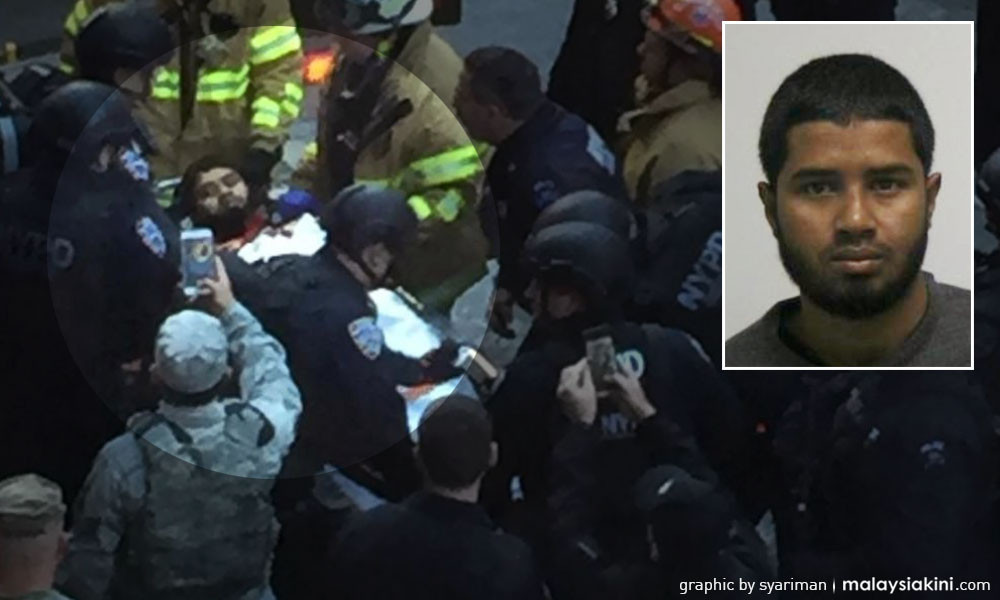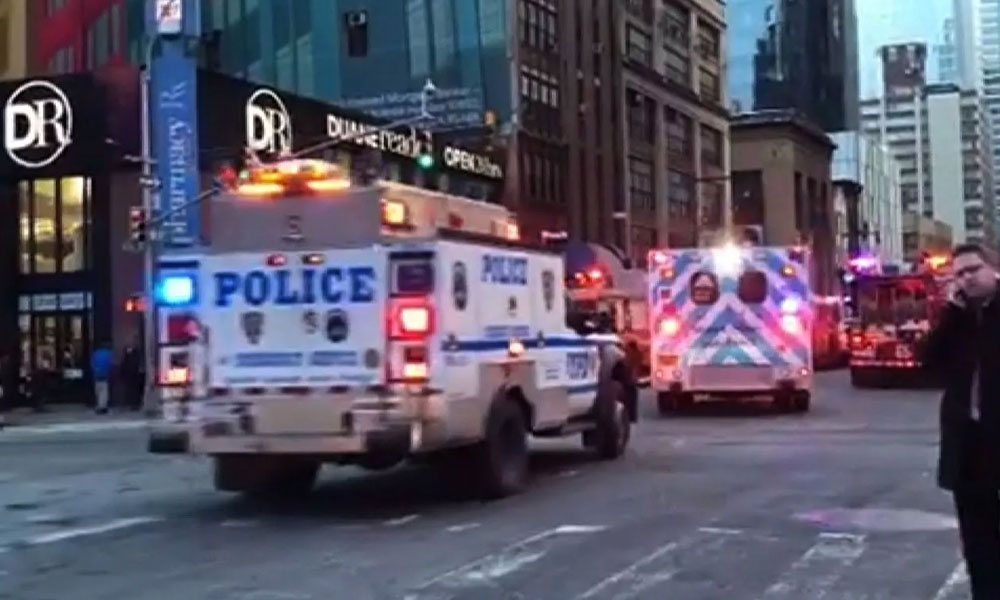A Bangladeshi man set off a homemade pipe bomb strapped to his body in a crowded New York City commuter hub during the morning rush hour yesterday, officials said, immediately calling it an attempted terrorist attack.
The suspect, Akayed Ullah, 27, was taken to a hospital after suffering burns from the explosive device, which was attached to his body with Velcro and zip tires and did not fully ignite, officials said. It was not clear whether the attack in midtown Manhattan was intended to be a suicide bombing.

The blast, which occurred around 7am local time (8pm in Malaysia) in a busy
underground passageway between the subway station underneath the Port Authority Bus Terminal and the Times Square subway station, sent commuters fleeing for the exits and police officers rushing to the scene, as officials scrambled to reroute trains and shutdown streets.
Three people, including a police officer, suffered minor injuries.
The attack came just six weeks after police said an Uzbek man, Sayfullo Saipov, plowed a truck through a crowd of pedestrians along a bike path in lower Manhattan, killing eight in an act for which Islamic State later claimed responsibility.
In September 2016, a man injured 31 people when he set off a homemade bomb in New York's Chelsea neighborhood.
In recent years, numerous people claiming to be inspired by Islamic State have carried out attacks across Europe, the Middle East and the United States.
A law enforcement official familiar with the Ullah investigation said investigators have found evidence that he watched Islamic State propaganda on the Internet.
'Amateur-level'
The weapon used in yesterday's attack was "amateur-level," New York Governor Andrew Cuomo said at a news conference near the explosion site. He told CNN the homemade bomb may not have fully ignited, possibly limiting the damage.

Officials said the attempted bombing underscored New York City's status as a target for such attacks, citing the attacks of Sept 11, 2001, which killed more than 2,750 people in New York and nearly 3,000 people in all, and the 1993 World Trade Center bombing, which killed six people.
"Let's be clear. As New Yorkers, our lives revolve around the subways," Mayor Bill de Blasio said at a news conference. "And let's also be clear, this was an attempted terrorist attack."
In a statement, President Donald Trump said the attack emphasised the need for US immigration reforms.
"America must fix its lax immigration system, which allows far too many dangerous, inadequately vetted people to access our country," he said.
The president also criticised the visa programme that allowed Ullah to enter the United States in 2011 because he had family members already in the country, saying such family visas are "incompatible with national security."
Authorities did not immediately comment on Ullah's motives.
Asked whether Ullah had claimed any connection to Islamic State, New York Police Commissioner James O'Neill said, "He did make statements but we're not going to talk about that right now."
Several US officials familiar with the investigation told Reuters there was no immediate information indicating Ullah was previously known to any American spy or law enforcement agency for any connection with militants or terrorism, though a connection could still be found.
Ullah is from the Bangladeshi city of Chittagong and is a US resident, said the country's police chief. He had no criminal record there and last visited Bangladesh on Sept 8, the chief said.
Ullah had a black cab/limousine driver's licence from 2012 to 2015, the New York Taxi and Limousine Commission said.
Yesterday's incident was captured on security video, police said. Video posted on NYPost.com showed smoke and a man lying in a long tunnel that connects sections of the sprawling Times Square subway station. A photograph showed a man lying face down, with tattered clothes and burns on his torso.
'Everybody was scared'
The explosion turned a normal start to the work week into a chaotic scene.
"There was a stampede up the stairs to get out," said one commuter, Diego Fernandez. "Everybody was scared and running and shouting."

The bus terminal was temporarily closed, and a large swath of midtown Manhattan was closed to traffic. Subway travel was disrupted but later returned to normal.
In December, New York experiences a surge of visitors who come to see elaborate store window displays, the Rockefeller Center Christmas tree and Broadway shows.
More than 200,000 people use the Times Square station, the city's busiest, each weekday, according to the Metropolitan Transportation Authority. Ten train lines stop at the station.
The bus terminal is the busiest in the United States, according to the Port Authority. On a typical weekday, about 220,000 passengers arrive or depart on more than 7,000 buses.
The bus terminal is adjacent to and above the subway station's western section. A long, narrow underground tunnel connects that part of the station to its eastern section, and is used by thousands of commuters during rush hour.
The incident rippled through American financial markets, briefly weakening stock markets as they were starting trading for the week and giving a modest lift to safe-haven assets such as US Treasuries.
Technology and energy stocks gained in afternoon trading, helping Wall Street shake off uncertainties following the explosion.
- Reuters

